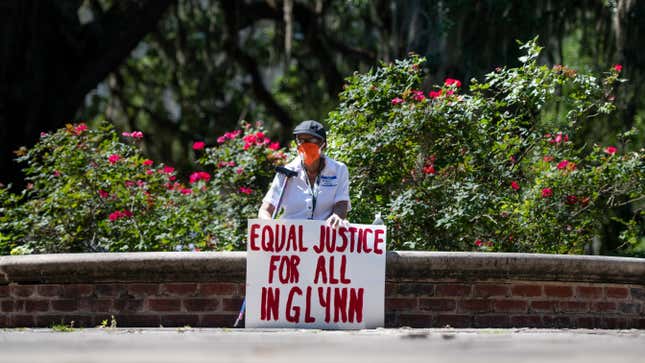Video Is Never Enough
Latest

“It’s a lynch mob,” said Marcus Arbery, father of Ahmaud Arbery, the 25-year-old black man who was shot and killed by white men in Glynn County, Georgia on February 23. On Thursday, 75 days after the shooting, two men—64-year-old Gregory McMichael and his 34-year-old son Travis McMichael—were arrested and are facing charges of aggravated assault and murder.
Arbery’s family says that Ahmaud, an avid jogger, was simply getting exercise in a nearby neighborhood when he was attacked. The McMichaels, however, told police that they believed Arbery resembled a suspect in a string of recent break-ins, and that they were apprehending a burglar. (There was no string of break-ins reported in the weeks before the shooting, according to a local lieutenant.)
Earlier this week, attorneys for the Arbery family released a video that appears to show Ahmaud running through a suburban street when a white pickup truck stops in front of him. Arbery runs around the vehicle and gets into a scuffle with a man holding a shotgun. Shots are fired, and Arbery falls to the ground.
Ahmaud Arbery’s father was right when he described, to PBS’s Yamice Alcindor, the attack as a lynch mob: A roving crew of armed white men harassing a lone black man, capturing the act via camera phone, the calling card of a modern-day lynching.
The footage was gut-churning, and it wasn’t long before the typical cycle of virality commenced. The video inundated Twitter and Facebook, paired with demands for the McMichaels’ arrest. Celebrities like Lebron James, Zoe Kravitz, and Michael B. Jordan expressed their disgust, as did politicians like Ayanna Pressley, Alexandria Ocasio-Cortez, Bernie Sanders, and Joe Biden. Hashtags emerged and reports on Arbery’s death were squeezed into cable news slots, a grim reprieve from covid-19 news and a harsh reminder that when it comes to racist attacks on black Americans, it’s business as usual.
Tom Durden, the District Attorney currently taking on the case, requested the help of Georgia Bureau of Investigation. The GBI began an independent investigation of Arbery’s death Tuesday evening, and two days later, announced that the McMichaels were in police custody.
-

-

-

-

-

-

-

-

-

-

-

-

-

-

-

-

-

-

-

-

-

-

-

-

-

-

-

-

-

-

-

-

-

-

-

-

-

-

-

-








































